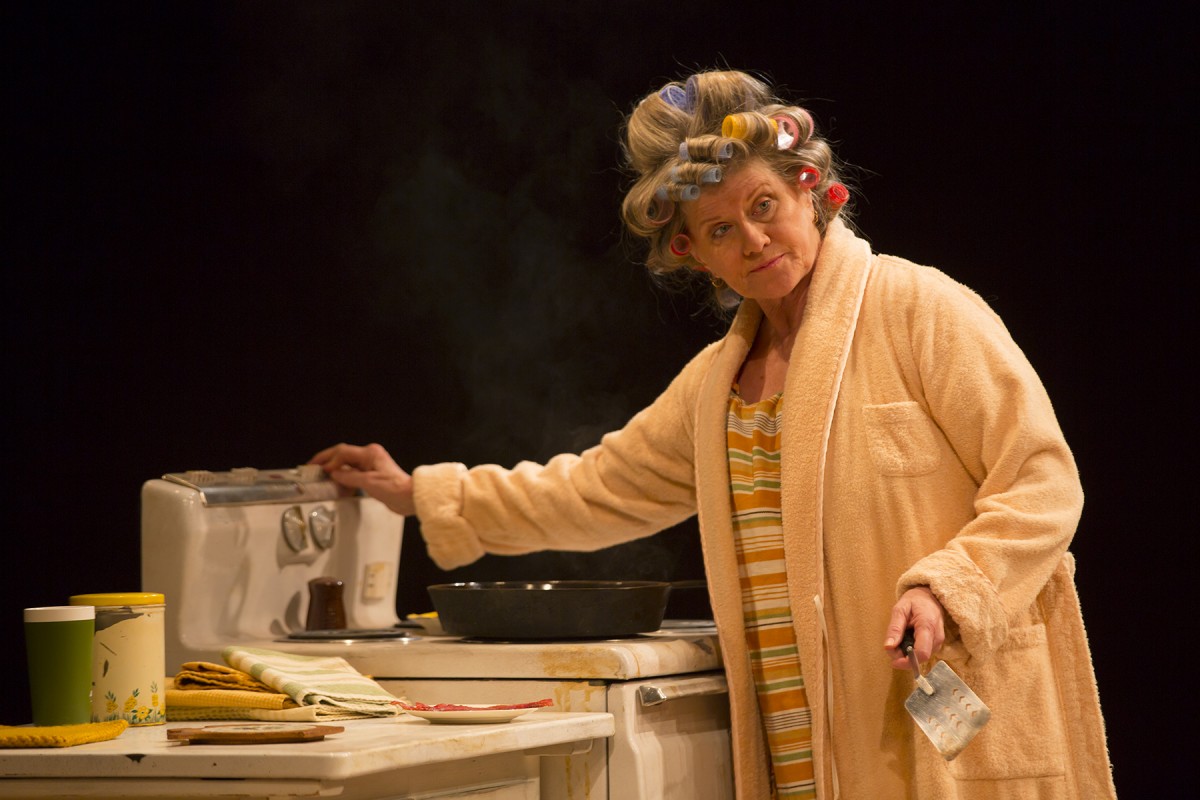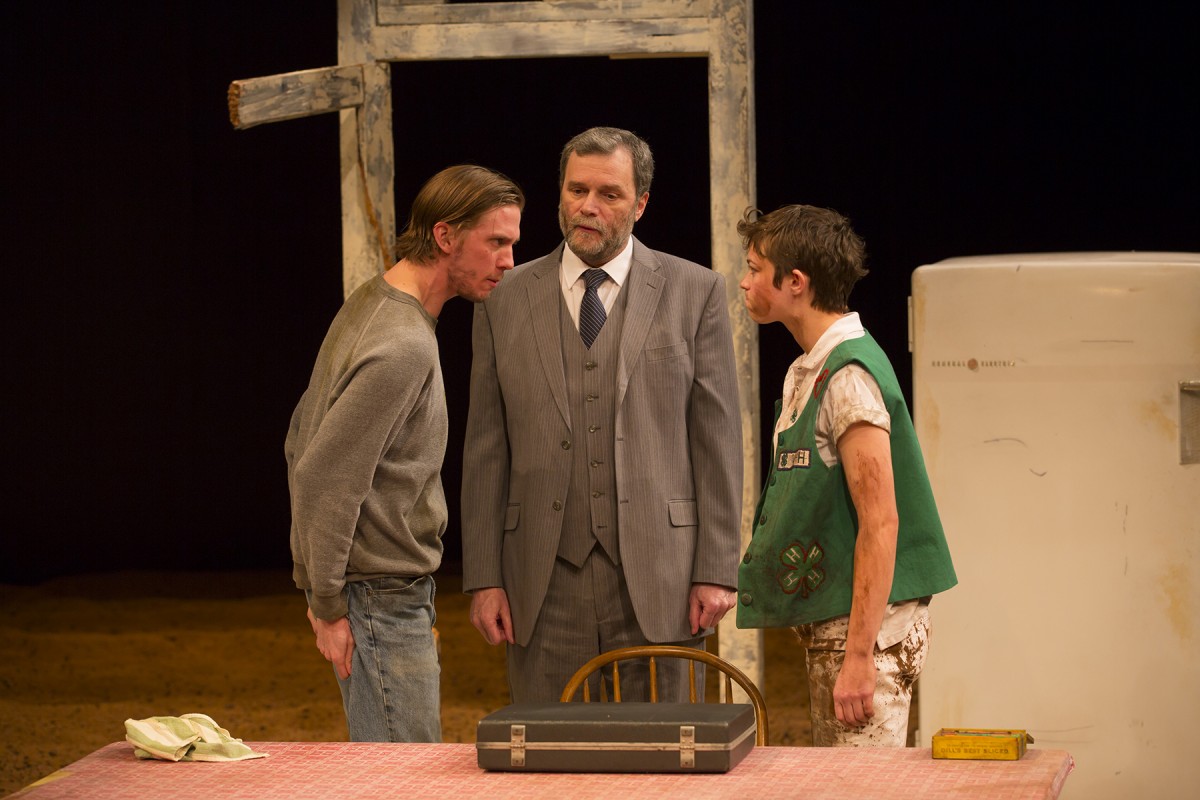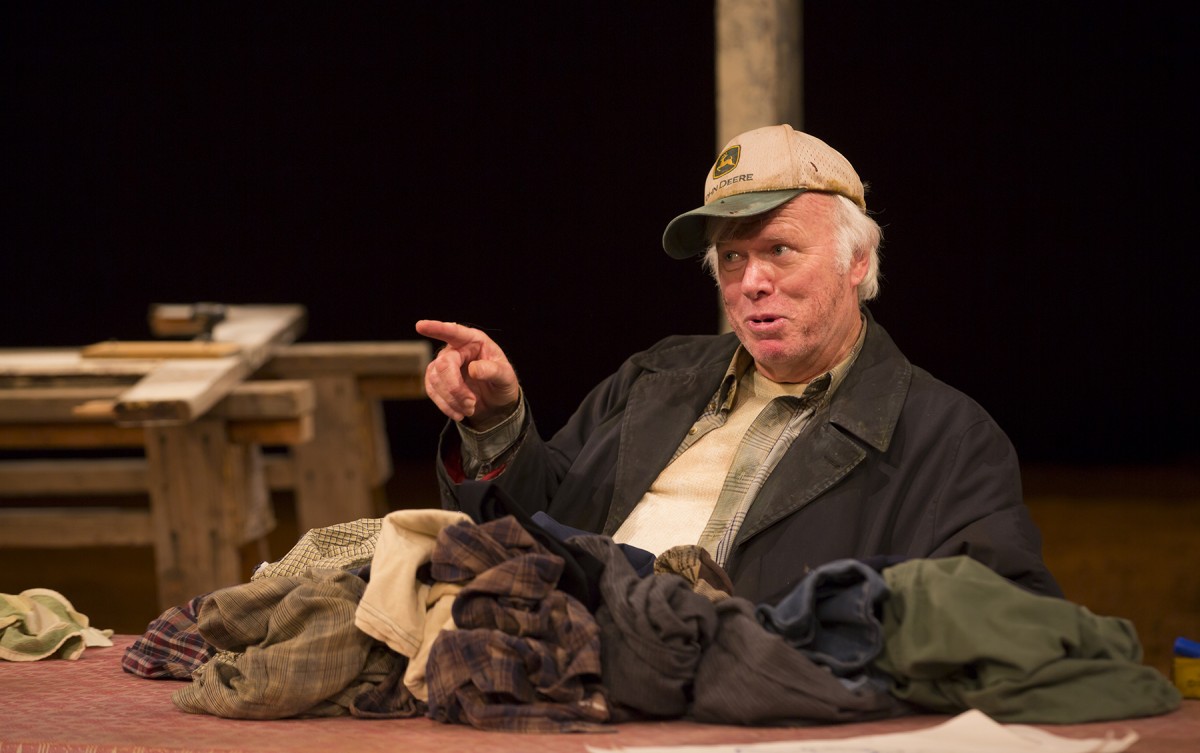The Long Wharf production of Sam Shepard’s Curse of the Starving Class, directed by Gordon Edelstein, presents us with a living classic. Shepard’s play dumps us in an America that always seems to be vanishing while remaining still tangible. It’s rural California, beloved of Steinbeck in the Depression Era, and of “back to nature” hippies in the Sixties. By the late Seventies, when the play was first produced, the region is on its way to becoming strip malls and apartment buildings.

With a stripped-down kitchen surrounded by prairie-like earth, Michael Yeargan’s set speaks of archetypes even before the play begins. What could be more emblematic of family life than a refrigerator, sitting near center stage? And what could be more enigmatic than a tall door frame with no door, attached to no wall? Emblems. Enigmas. The theater of Sam Shepard makes the most commonplace things bristle with crazy possibilities. It’s the nightmare of the everyday.
The first half of the show, while able to keep us off-guard with the oddity of the Tate family, is mainly comic. Much of the humor derives from Judith Ivey’s delivery as Ella, the mother. She has mastered an emphatic tone that plays it slow as if considering possible replies, coming out with comments that can be prickly or non-committal. Ivey’s pitch is perfect, as she transforms from a frumpy housewife into a woman on the make, trying to sell the family property out from under her drunken, abusive husband Weston (Kevin Tighe). It’s he who broke down the door and, listening to her comments, we might readily take her part in what might seem a play of domestic disturbances. That is until we meet the smarmy lawyer Taylor (John Procaccino) with whom she may be doing more than business.
Shepard is the poet of the proles—his grasp of the intonations and rhythms of the everyday Americans we find in trailer parks and malls and on ranches and rural hang-outs is as distinct to him as flowery Southern politesse is to Tennessee Williams. Hearing the lines of the play delivered with a feel for its curious mix of the lyrical and the laconic is reason enough to see this production. But Shepard is also the kind of playwright who wants the theatrical experience to be off-putting. And so there’s a live lamb onstage at times, in a pen; there’s urination, nudity, an explosion, an appalling episode of binge eating, and a creepy carnivalesque feeling that makes the Second Part seem a descent into an accursed place indeed. Edelstein’s production delivers all the unpleasantness with a casual absurdity that benefits from the Long Wharf’s thrust stage. It’s a fascinating show.
Much of the unsettling nature of the play comes from Wesley (Peter Albrink), the eldest child and only son of the Tates. Wesley is unpredictable, surly and rather unsettled himself. A tour de force speech delivered early in the play establishes the kind of dread he feels in relation to his father. Wesley seems attached to the farm while the others are determined to sell it or leave it or both, but his attachment may be based on neurotic frustrations. Of all the characters, he is the most enigmatic, and Albrink has a command of the character’s shuffling uncertainty and morose sarcasm. We might easily take the younger generation’s side against the elders if it weren’t that Wesley is so brooding. Urinating on his sister’s 4-H posters is the kind of callow act that keep us distanced from him.
As the daughter, Emma, Elvy Yost is tomboyish and pert. She wears a 4-H outfit at first and seems girlishly forthright—as her mother lectures her about getting her first period—but, later, in a cowboy hat and chaps, she begins to transform into the kind of figure we might assume Shepard wants to pin our hopes on. She is clear-eyed enough to see through Taylor—Procaccino gives Taylor’s efforts to put her at her ease a nice, slowburn comic tension—and determined enough, perhaps, to get away from the family vacuum. Yost sounds perhaps a bit too contemporary in her tone, but that only underscores that she, if anyone here, is the future. Her fate says much about what Shepard thinks about that.
As Weston, the irascible patriarch, Kevin Tighe is commanding. Our early view of him finds him even more surly than his son. He has nothing but disdain for his family and their home. His humor is of the kind that comes close to abuse, and yet he compels a kind of natural respect. He is the man of the house, regardless. Later, he sobers up, and Shepard gives the character a great speech about how he got into debt that rings with right-on familiarity in Fiscal Cliff America. Seeing Tighe cooking breakfast at the stove and lecturing his son and wife takes us close to the “father knows best” America we once grew up with. Of course it will all go bad.
And don’t forget the lamb. As a sacrificial victim, scapegoat, what-have-you, the symbolism is a bit too overt, but, in her actual presence, Edie steals her scenes—on Opening Night, she reacted to Ella’s insistence that the creature be removed from the kitchen with a perfectly timed bleat, and seemed to hush up contentedly while the man-of-the-house maundered about, talking to her as to himself. It made the audience laugh and play to see a lamb on stage, too much perhaps, but I suspect that its antics will be the one heart-warming moment people take away from this harrowing, at times hilarious, at times grotesque production.
Curse of the Starving Class By Sam Shepard Directed by Gordon Edelstein
Set Design: Michael Yeargan; Costume Design: Clint Ramos; Lighting Design: James F. Ingalls; Sound Design: Fitz Patton; Composer: Doug Wieselman; Animals: William Berloni; Stage Manager: Bryce McDonald; Assistant Stage Manager: Amy Patricia Stern; Assistant Stage Manager: Sara Cox Bradley; Casting: James Calleri, CSA
Long Wharf Theatre February 13-March 10, 2013



